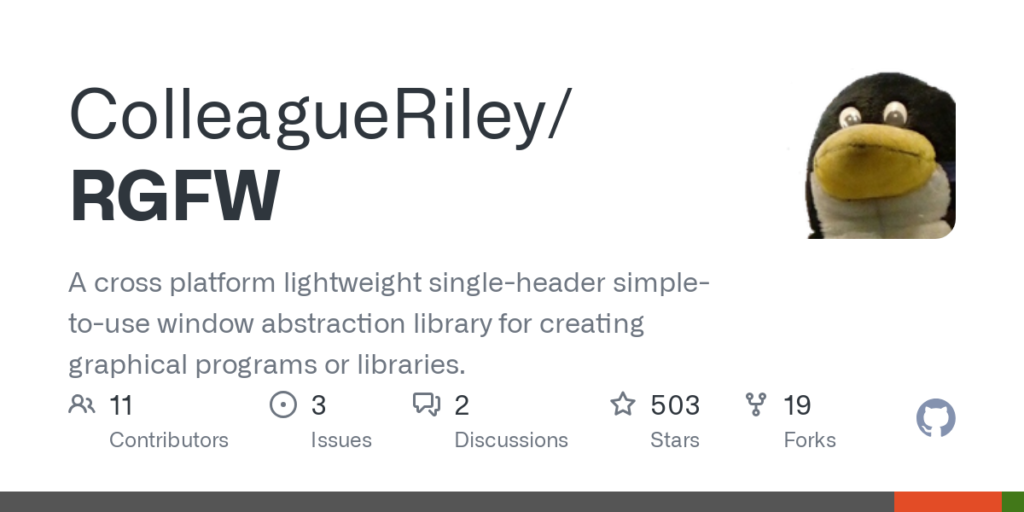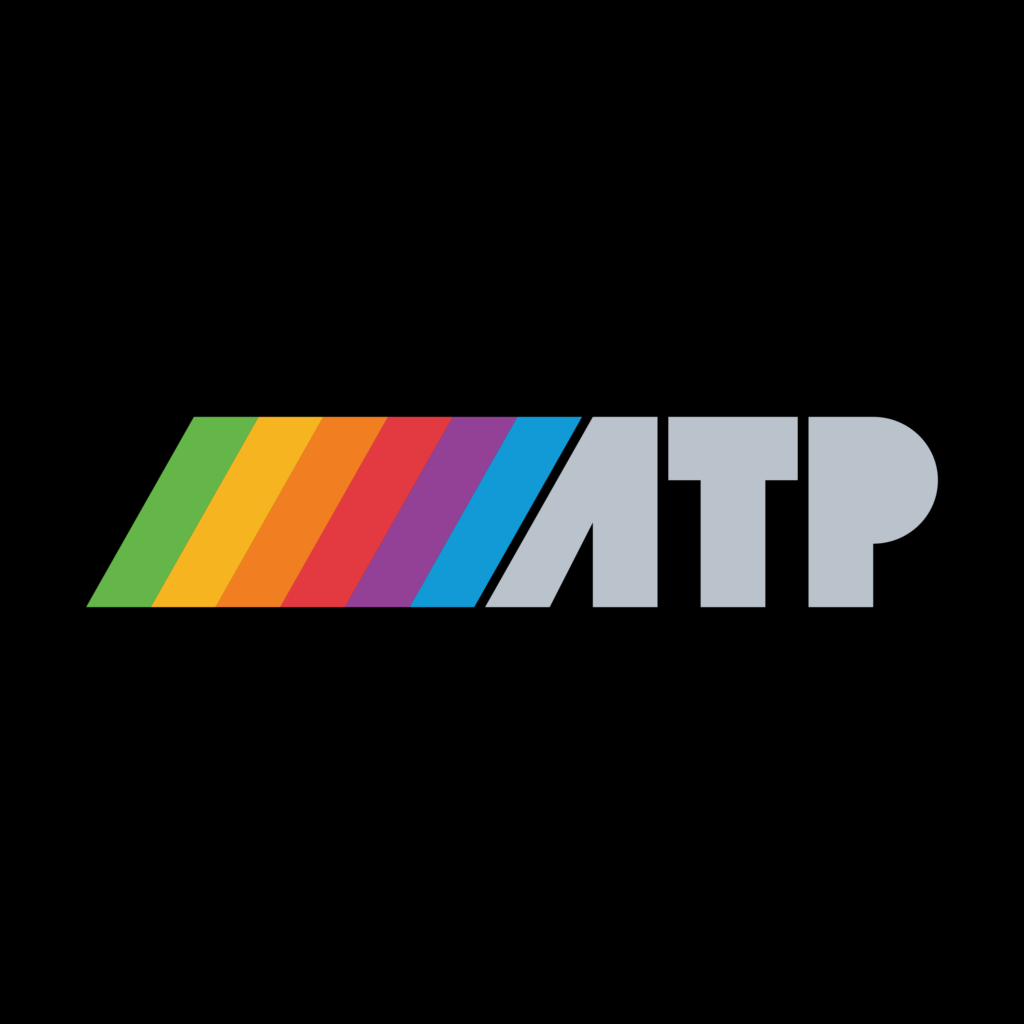A cross-platform lightweight single-header very simple-to-use window abstraction library for creating graphics Libraries or simple graphical programs. Written in pure C99.
RGFW is a free multi-platform single-header very simple-to-use window abstraction framework for creating graphics Libraries or simple graphical programs. it is meant to be used as a very small and flexible alternative library to GLFW.
The window backend supports XLib (UNIX), Cocoas (MacOS), webASM (emscripten) and WinAPI (tested on windows XP, 10 and 11, and reactOS)
Windows 95 & 98 have also been tested with RGFW, although results are iffy
Wayland: to compile wayland add (RGFW_WAYLAND=1). Wayland support is very experimental and broken.
The graphics backend supports OpenGL (EGL, software, OSMesa, GLES), Vulkan, DirectX, Metal and software rendering buffers.
RGFW was designed as a backend for RSGL, but it can be used standalone or for other libraries, such as Raylib which uses it as an optional alternative backend.
RGFW is multi-paradigm,
By default RGFW uses a flexible event system, similar to that of SDL, however you can use callbacks if you prefer that method.
This library
- is single header and portable (written in C99 in mind)
- is very small compared to other libraries
- only depends on system API libraries, Winapi, X11, Cocoa
- lets you create a window with a graphics context (OpenGL, Vulkan or DirectX) and manage the window and its events only with a few function calls
This library does not
- Handle any rendering for you (other than creating your graphics context)
- do anything above the bare minimum in terms of functionality
- Linux
- Raspberry PI OS
- Windows, (XP, Windows 10, 11, ReactOS)
- MacOS, (10.13, 10.14, 14.5) (x86_64)
- HTML5 (webasm / Emscripten)
A list of GUI libraries that can be used with RGFW can be found on the RGFW wiki here
The examples can also run in your browser with emscripten
The examples can be compiled by using make debug, which compiles them in debug mode and then runs them
or make which simply compiles them.
The dx11 example has its own Makefile functions because it is Windows only, those include
make DX11 and make debugDX11
You can do CC=compiler to specify a specific compiler
Tested and supported compilers include, gcc, clang, [x86_64 / i686-w64]-w64-mingw32-gcc, cl (linux AND windows)
tcc has also been tested but work on linux only
A basic example can be found in examples/basic, it includes a basic OpenGL example of just about all of RGFW’s functionalities.
The event example can be found in examples/events, it shows all the events and the data they send.
The callback example can be found in examples/callbacks, it shows all the events and the data they send, but processed with callbacks instead.
examples/dx11 is a minimalistic example of the use of DirectX with RGFW
examples/gl33 is a minimalistic example of the use of OpenGL 3.3 with RGFW, this example was made by AICDG
examples/gles2 is a minimalistic example of the use of OpenGL ES 2 with RGFW
examples/vk10 is a minimalistic example of the use of Vulkan with RGFW, this example was made by AICDG
It also includes examples/vk10/RGFW_vulkan.h which can be used to create a basic vulkan context for RGFW.
A basic example can be found in examples/basic, it includes a basic OpenGL example of just about all of RGFW’s functionalities.
examples/buffer is an example that shows how you can use software rendering with RGFW using RGFW_BUFFER mode which allows you to render directly to the window’s draw buffer.
examples/PortableGL is an example that shows how you’d use RGFW with portablegl.h.
examples/first-person-camera is an example that shows how you’d make a game with a first person camera with RGFW
#define RGFW_IMPLEMENTATION
#include "RGFW.h"
u8 icon[4 * 3 * 3] = {0xFF, 0x00, 0x00, 0xFF, 0xFF, 0x00, 0x00, 0xFF, 0xFF, 0x00, 0x00, 0xFF, 0xFF, 0x00, 0x00, 0x00, 0xFF, 0xFF, 0x00, 0xFF, 0xFF, 0xFF, 0x00, 0xFF, 0xFF, 0x00, 0x00, 0xFF, 0xFF, 0x00, 0x00, 0xFF, 0xFF, 0x00, 0x00, 0xFF};
void keyfunc(RGFW_window* win, u32 keycode, char keyName[16], u8 lockState, u8 pressed) {
printf("this is probably early\n");
}
int main() {
RGFW_window* win = RGFW_createWindow("name", RGFW_RECT(500, 500, 500, 500), (u64)RGFW_CENTER);
RGFW_window_setIcon(win, icon, RGFW_AREA(3, 3), 4);
RGFW_setKeyCallback(keyfunc); // you can use callbacks like this if you want
i32 running = 1;
while (running) {
while (RGFW_window_checkEvent(win)) { // or RGFW_window_checkEvents(); if you only want callbacks
if (win->event.type == RGFW_quit || RGFW_isPressed(win, RGFW_Escape)) {
running = 0;
break;
}
if (win->event.type == RGFW_keyPressed) // this is the 'normal' way of handling an event
printf("This is probably late\n");
}
glClearColor(0xFF / 255.0f, 0XFF / 255.0f, 0xFF / 255.0f, 0xFF / 255.0f);
glClear(GL_COLOR_BUFFER_BIT);
RGFW_window_swapBuffers(win);
}
RGFW_window_close(win);
}
linux : gcc main.c -lX11 -lXcursor -lGL
windows : gcc main.c -lopengl32 -lshell32 -lgdi32
macos : gcc main.c -framework Foundation -framework AppKit -framework OpenGL -framework CoreVideo
There is a lot of in-header-documentation, but more documentation can be found at https://colleagueriley.github.io/RGFW/docs/index.html
If you wish to build the documentation yourself, there is also a Doxygen file attached.
A list of bindings can be found on the RGFW wiki here
A list of projects that use RGFW can be found on the RGFW wiki here
There is a RGFW wiki page about things you can do if you want to support the development of RGFW here.
A comparison of RGFW and GLFW can be found at on the wiki
RGFW uses the Zlib/libPNG license, this means you can use RGFW freely as long as you do not claim you wrote this software, mark altered versions as such and keep the license included with the header.
Permission is granted to anyone to use this software for any purpose,
including commercial applications, and to alter it and redistribute it
freely, subject to the following restrictions:
1. The origin of this software must not be misrepresented; you must not
claim that you wrote the original software. If you use this software
in a product, an acknowledgment in the product documentation would be
appreciated but is not required.
2. Altered source versions must be plainly marked as such, and must not be
misrepresented as being the original software.
3. This notice may not be removed or altered from any source distribution.


